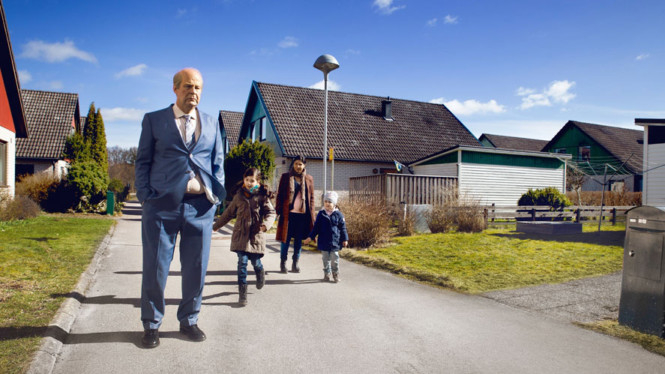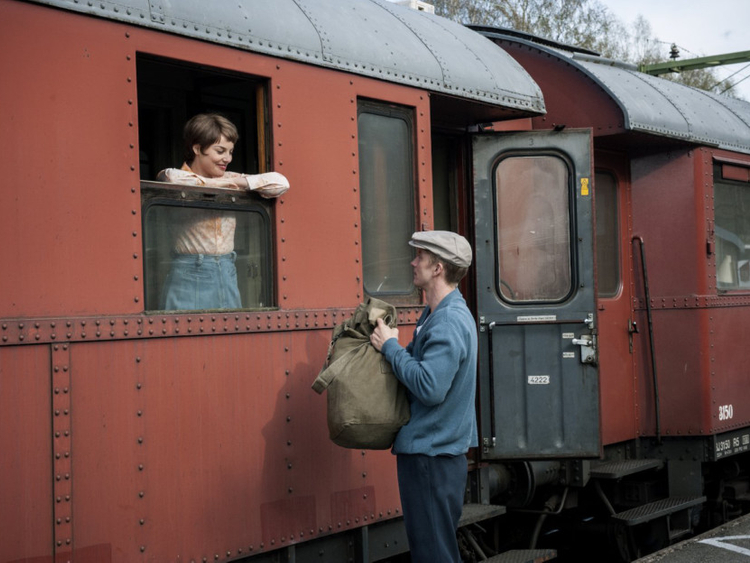
A darkly comedic Swedish film about finding hope despite all efforts to extinguish it will hit theatres this weekend in the UAE.
A Man Called Ove follows the journey of a grumpy old widower trying — and failing — to end his life, due to a litany of tragic happenings that the film flashbacks to. The movie, based on a book of the same name, will screen at Cinema 9 in Mall of the Emirates from May 18 until May 31, as part of independent cinema initiative DIFF 365@VOX.
Despite all of Ove’s efforts to close himself off to the world, a pesky family next door chips away at his resolve. Parvaneh is at the helm of said neighbours — a pregnant wife of Iranian descent who persistently agitates Ove while also endearing herself to him. She’s played by Iranian-Swedish actress Bahar Pars. Pars had plenty of reservations going into the role — namely, that it would be a cliched portrayal of Iranians.
“We are many Iranian actors and actresses living in Sweden from different generations. And all of us Iranian, all immigrants from other countries having the same problem [with the film industry],” she said.
“It’s always whitewashing, and if it’s not, it’s always stereotyped. Because they can’t tell our stories, and they don’t do the research too much. Here, I felt like really I must do it myself, and you must trust me — and they trusted me.”
Prior to landing the role, Pars had heard of the best-selling book by Fredrik Backman, but hadn’t it read it yet. She was disappointed in the lack of depth Parvaneh had been given in the novel — something she hoped to remedy in the film.
“Ove is just representing himself,” said Pars. “Parvaneh is representing her whole country.”
Director Hannes Holm believed in Pars’ vision, giving her his blessing to do as she pleased with the character. She became involved in every department — from makeup to furniture, down to where a certain rug would hang: on the wall, or on the floor.
She also tried to fill in the blanks from the novel. For example, Pars said, Backman would tell readers that Parvaneh had said something in Persian, but wouldn’t actually spell it out.
“In the film, I’m like, ‘Okay, I must say that word — so what is she saying?’” recalled Pars. “It was a hard job. I just want to go to set and be an actress, but I couldn’t really do that.”
Pars clicked immediately with Rolf Lassgard, who played the leading role of Ove. She found that his portrayal of an irritable old man made the story accessible to audiences around the world.
“It’s actually so funny, because my father was like, ‘I’m like Ove — I’m also very grumpy.’ I think the grumpy man is universal. Everybody knows somebody who thinks they know everything — I think we can relate to that generation of men, a 100 per cent,” she said.
Parvaneh, meanwhile, represented the unknown to Ove — something he didn’t have a grip on, despite his world-weariness.
“They meet each other, and they’re in this fight together. She’s like, ‘I’m strong,’ and he’s like, ‘I’m also strong, so let’s do it.’ And of course she’s representing love, also — it’s a friendship love story,” said Pars.
The actress, who considers this her breakthrough role, built Parvaneh’s world nearly from scratch, but couldn’t relate to her patience — nor her housekeeping skills.
“When I was 20-something, I decided that I’m not going to be that Iranian woman who cooks. It was actually feministic from my side — I’m not going to be that woman. That was really funny, that Parvaneh could cook — I can eat, but I can really can’t cook,” said Pars.
“And the patience that Parvaneh has with Ove, I don’t know if I have that patience with many of the Swedish people. Because it’s not just Ove that has this attitude — if you meet this attitude five times each day, at the least, you won’t have that patience anymore. She’s much nicer, I think.”
She hoped that the movie would encourage people to challenge their own prejudices and rethink how they treat others.
“I really believe in people,” she said. “I believe that everybody inside, they are good, and you can reach them. You can reach everybody. They just have different keys.”












